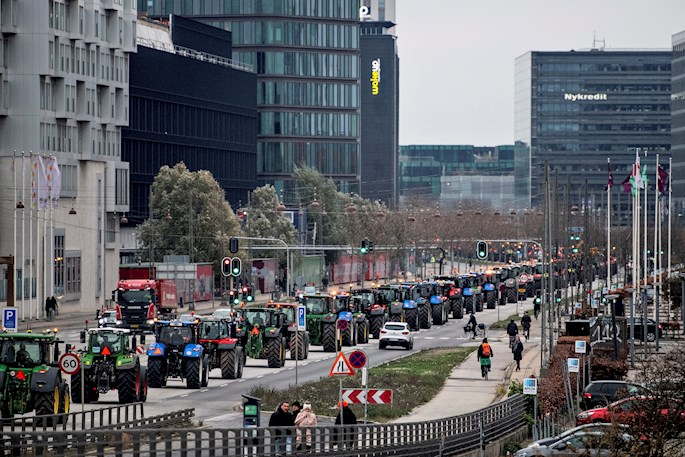Mink cull shuts fur industry, triggers political storm in Denmark
Published : 21 Nov 2020, 22:36
Updated : 22 Nov 2020, 01:14
The Danish government's decision to cull millions of mink because of a mutation of the coronavirus that could affect the effectiveness of vaccines has closed down the fur production of the world's largest breeder of the animals, triggering a political storm that has already caused the resignation of one minister.
When the Social Democrat Prime Minister, Mette Frederiksen, ordered about 15 million mink in Denmark to be culled earlier this month, following the advice of health authorities after they detected mutations of the virus that had jumped to humans and weakening the ability to create antibodies, she put a sudden stop to a highly lucrative industry.
Dating back 90 years, mink breeding in Denmark accounted for four percent of its agricultural exports, employing some 6,000 people.
"We have been forced to make this decision and the conclusion is not negotiable. That is our conviction," said Frederiksen at the time, whose political profile had been boosted by the government's speedy and effective response to the pandemic.
What the Danish leader did not foresee was the storm that would break out in the following days, when it was discovered that the minority Social Democratic government did not have the legal backing to order the cull of all mink in the country, but only on farms where the infection had been detected or were within a radius of 7.8 kilometers of the infected facilities.
Although the government improvised a reform with its center-left allies to give the order legality and ban mink farming until 2022, pressure from the media, the opposition and its own parliamentary supporters forced Agriculture Minister Mogens Jensen to resign on Wednesday.
Jensen left office on the same day that the results of three internal investigations were published, which revealed that he had already been warned in September, when the mink outbreak was starting to grow, of the legal problems of a possible cull of the entire mink population. The inquiries also found that this message was repeated a month later by the ministerial task force on Covid-19.
Frederiksen was not warned of the legal issue until four days after the culling announcement, the internal investigation found, but she did not stop the order, instead limiting herself to informing Parliament by letter, while mink farmers did not receive notice from authorities until 48 hours later.
"It's a little strange that I keep getting asked this question when it comes to the health of the Danes. We did not make the decision to sacrifice all the minks for fun," she reiterated two days ago. Freriksen, like several of her ministers, has publicly regretted the "mistake" and apologized.
Denmark, which has a population of 5.7 million inhabitants, has so far registered 68,894 cases of coronavirus and 781 deaths, with a mortality rate of 13.3 deaths per 100,000 inhabitants.
PARLIAMENTARY INVESTIGATION
The government has shuffled some people at the agriculture ministry in the wake of Jensen’s resignation, but the measures have not satisfied the Danish media, which is demanding more responsibility, nor the opposition, which has used terms like "catastrophe", "scandal" or "madness" for its actions.
"Minkgate" took another twist when it was revealed that the National Police told officers to inform the breeders of the obligation to cull their mink despite the fact that knowing that the order was illegal if no infections had been detected at the facility or if it was not near to another that had been the site of an outbreak.
"This is a failure that I deeply regret. We have a lot of work to do, and unfortunately, sometimes there are failures. I want to apologize personally to the breeders who have received misinformation," the director of the National Police, Thorkild Fogde, said Thursday.
Several parties have called for the creation of a commission to investigate the case, a request that the government ultimately accepted.
COMPENSATION CONTROVERSY AND BREEDERS' PROTESTS
The Danish Breeders Association has criticized what they consider an expropriation and a scandal, accusing the government of "violating the Constitution", in the words of its president, Tage Pedersen.
Hundreds of farmers from all over Denmark, riding their tractors, participated in rallies held in Copenhagen and in Aarhus, the country's second city, on Saturday, to protest the authorities' response to the outbreak.
Prominent figures from all the right-wing parties supported the rally in a protest held near the port of Copenhagen.
The government is in negotiations with other parties about a compensation package for mink breeders which could exceed the 2.8 billion crowns (376 million euros) worth of losses initially calculated by the authorities.
Those steep figures have also led to criticism from other sectors affected by the pandemic, both because of the controversy surrounding an industry that is already banned in other European countries and because the fur industry has been flagging in recent years.
In 2013 Denmark had 1,169 farms dedicated exclusively to mink breeding, bringing in average annual profits of 443,000 euros, while six years later there were only 792, suffering average losses of 94,000 euros and exports had fallen by 63 percent, according to figures from the National Statistics Office.
While the political controversy continues to grow, the alarm created by the SARS-CoV-2 mutation has apparently disappeared: health authorities this week considered it "highly probable" that the strain had been eradicated and would lift the tough restrictions in place in northern Jutland early.


